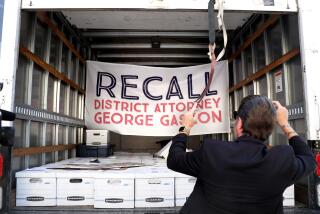Paid Signature Gatherers
- Share via
Re “At a Dollar Per Signature, Recall Effort Is a Living,” July 7: Why are we surprised that there are hordes of professional petition gatherers working in the Gray Davis recall campaign? Whenever I am confronted with the pushy, dissembling requests to sign a petition, I always ask who is behind the effort.
Almost without exception, the gatherer cannot give me any useful information. I have seen the same people working on many different issues in front of the most active places of business. It demonstrates how shallow their concern is for the signatures they are seeking: about $1 deep.
What this spectacle points out is that if there is to be any effort to remove elected persons from office, it should be directed at those in our Legislature. They dodge controversial issues, refusing to act, when that is their elected responsibility. The end result is the deluge of initiatives that clutters our ballots at each election. Almost none of these measures can stand up to judicial scrutiny, because they have failed to go through the refining process demanded by legislative action. When challenged in the courts, they are often thrown out and the electorate feels that its wishes have not been heard. No wonder so few people take the time to vote anymore. The people in office do very little of use for our state and constantly allow the buck to be passed to the initiative process.
Sherri Lipman
Fullerton
*
Your article on payment for the gathering of signatures on recall petitions is a somber reminder of just how far off the track the use of recall has gone. The right of petition and recall was added to the California Constitution in 1911, right after Hiram Johnson was elected governor on a platform of taking back the state Legislature from railroad interests that had controlled it for many years through the funding of election campaigns and outright bribery of sitting legislators.
The use of the petition and recall process now is almost exclusively controlled by moneyed interests pursuing a private agenda. In other words, the process has been entirely reversed -- from the use of petition and recall to control special-interest groups that have obtained a disproportionate influence in the Legislature, petition and recall are now prime vehicles used by private-interest groups to advance their private agendas at the state level.
The right to set up tables in shopping centers and outside mega-stores (technically on private property) for the purpose of collecting signatures on political petitions was recognized as a form of free speech by the U.S. Supreme Court in 1980 in Pruneyard Shopping Center vs. Robins -- a case arising in California, interestingly enough. Some of the signature gatherers recognized in Pruneyard have gone on to make the aggressive San Francisco panhandlers that Mayor Willie Brown recently complained about look like shrinking violets. This entire process is in need of overhaul.
Gerald Blankenship
Riverside
*
It is ironic that the initiative process, a tool intended to bring a greater measure of democratic input to government, has ended up being hijacked by the same big-money interests that threaten the rest of our democracy.
The solution would be to make it illegal to pay for such signature-gathering. Thus, any measure qualifying for the ballot would be a reflection of true, grass-roots activism. Unfortunately, since term limits have stocked our Legislature with amateurs, such a bold measure would be unlikely to pass. Therefore, it would have to qualify for the ballot via the initiative process.
Evan Puziss
Mar Vista
*
“In Trenches of a Rebellion” (July 6) paints a noble picture of petition gatherers. Sitting in front of a Wal-Mart calling out for shoppers to recall Davis may be a hard way of earning a living, but that’s what it is, a job. I always ask these anything-for-a-dollar types what they’re getting paid per signature. They never say.
The article calls them “foot soldiers,” as if they’re in a war for democracy. Instead, they’re mercenaries in a campaign funded by millionaires.
Tarja Ann Black
Lancaster
More to Read
Get the L.A. Times Politics newsletter
Deeply reported insights into legislation, politics and policy from Sacramento, Washington and beyond. In your inbox twice per week.
You may occasionally receive promotional content from the Los Angeles Times.









